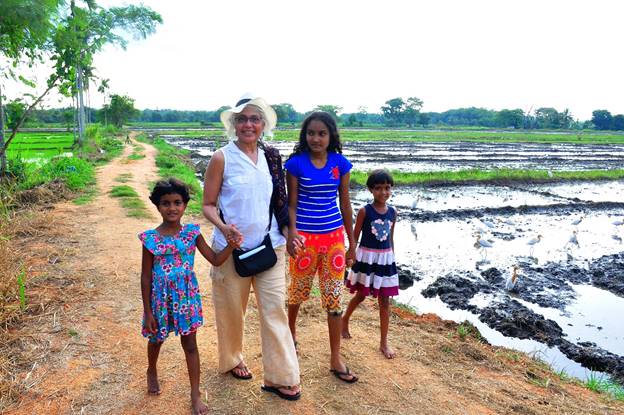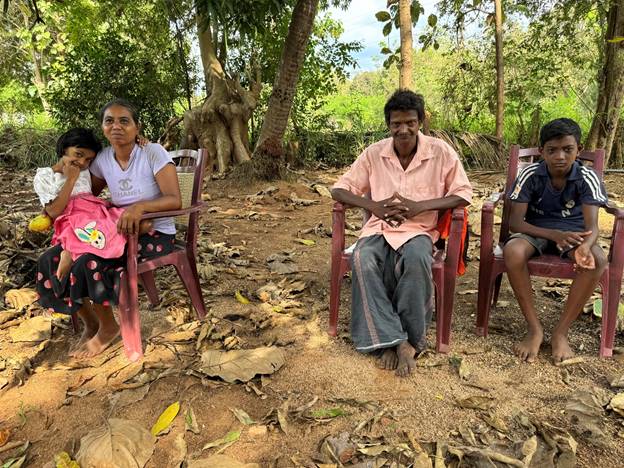
Jayani Kumari and her mother Indrani Kumari - Photo by Ben Samarasinghe
Hope, Wisdom and Cynicism: Voices from rural Sri Lanka
By Beena Sarwar
Sri Lanka

Times are tough and it's hard to make ends meet. A refrain heard from just about anyone in my home country Pakistan where the rupee has dropped to around 300 to the dollar. This is now comparable to the rupee in Sri Lanka, recovering from the biggest economic crash in its history.
Stories of hardship echo from the island nation’s largest city Colombo to the farming heartlands around Anuradhapura district, a little over 200 km to the north-east. At the core of Anuradhapura lies the irrigation tank called Dutuwewa which sustains several villages.
Sri Lanka's rural landscape is dotted with as many as 14,000 such large and small irrigation lakes, known as wewas, built by kings thousands of years ago.
A nearly five-hour drive on surprisingly good roads - a testament to the rural infrastructure built after the end of the 26-year civil war 15 years ago - brings us to the serene lakes, lush paddy fields and dense forests of Dutuwewa. A world away from the corridors of power and the glittering, air-conditioned, high-rises of Colombo and its historic colonial buildings left behind by 500 years of colonizers - the Dutch, the Portuguese and the British.
A school in village
The headmistress of the Palugollagama government school, who gives only her initials and last name, I. R. Ekanayake, is an 'old girl' who taught at schools around the district for 26 years and was posted to her alma mater as principal four years ago. There are two vice principals, 36 teachers and 506 students.

Walking through the paddy fields - Photo by Ben Samarasinghe
The school runs from kindergarten to grade 13 or 'A' levels. The teachers and students all, belong to local farming families. Some have lived in the 'purana gama' (ancient village) for centuries.
Others are 'settlers' from different castes, each family provided one acre of paddy and three acres of dry land in the 1950s. Their influx did not upset the homogeneity of the area, where a syncretic culture prevails. Statues of King Mahasena (277–304 CE), who built many tanks in the area are deified as much as representations of the Buddha that can share shrine space with the Hindu god Ganesh.
The Palugollagama school has six buildings. Teachers and parents have converted a bicycle shed on the hillside into a shared space for grades 7 and 8. There are no fans, but a soft breeze wafting through the open sides eases the oppressive heat and humidity. Solar panels at the entrance of the school power only light bulbs.
There are also trees everywhere. The resident owl in one of them falls out during the day's heat. Worried about the crows and dogs, the villagers collaborate to put him back, one man throwing a blanket over him from behind, and another climbing the tree with the bird under his arm. The blanket removed, the confused owl flutters back to the roadside. The villagers good-naturedly repeat the exercise, this time throwing the blanket-wrapped owl up to a boy who has perched himself up higher on the tree.

The lakes, paddy fields, and forests of the ancient village of Dutuwewa are a world away from Colombo's high-rises and colonial buildings. As elsewhere, decisions taken by 'old men' in the corridors of power impact life here, just as these rural voters will impact politics nationally - Photo by Ben Samarasinghe and Beena Sarwar
Deftly catching the owl-bundle, he wedges the bird in at a higher level.
Politicians only come here at election time and no teacher can survive on the government salary, the teachers tell me. They manage only because they are all also farmers and most of them have land.
Despite the challenges, the school boasts a high rate of achievement, competing in national athletics and football tournaments. The sweeping reforms from the sixties onwards by successive governments in Sri Lanka, and the extra weightage to students from rural backgrounds ensure that several students a year go on to university.
With free education for all between 5 to 16 years instituted since 1945, Sri Lanka boasts the highest literacy rate, nearly 99%, in the region.
Parent-teacher unity
The village school struggles for resources, says Principal Ekanayake. "Everything you see here is the work of parents, the result of unity between parents and teachers."
When the roofs get damaged, it is the parents who help rebuild them. Asbestos - cheaper, maintenance-free, has replaced the traditional, climate-friendly red shingles.
Amila Sampath, 30, a local farmer accompanying us has a five-year-old daughter in this school. He in turn is a former student of Principal Ekanayake at another school.
If he were president or prime minister, he would reform education. "People don't vote wisely. I would enhance knowledge of political systems. This country is being mishandled by old people."
Nearly a quarter (24.9%) of Sri Lanka's population was under 15 years old at the start of this year. It was the youth that led the popular uprising against the previous government, forcing President Gotabaya Rajapaksa and his brother Mahinda, the Prime Minister, out of power.
That afternoon, a family living down the road from the house we're staying at, comes to see me. The daughter, six-year-old Jayani, who studies in class 2 at the Palugollagama school, had seen our white van go past their shack and dragged her family, all barefoot, over to meet me - they had never seen "a foreigner" before.
They live in a temporary shelter and are desperately poor, our hosts tell us. Teachers at the school have given them plastic sheets to protect them from the weather.
Jayani stays perched on her mother Indira Kumari's lap. Her father Ajit Kumara says he's 45 but looks older. Jayani's brother Kavishka Madhu, 13, goes to a temple school, which he prefers because it's 'easier'.
"He's a good dancer," volunteers Indira, 35.
Her smile fades as she mentions her own mother, paralyzed and bedridden. Ajit Kumara's aged parents live with them too. Like everyone else here, they are farmers - but have no land of their own.
Dreams
I ask Kavishka what he wants to be when he grows up.
"Policeman", he responds.
And Jayani? "Doctor", she whispers after a pause.
As the barefoot family takes leave and walks away, I wonder if their dreams will come true. Despite the difficulties, students from rural areas do get to universities and follow professional careers. What counts against them is the lack of English and computing skills.
In the paddy fields later Rishma, a lanky teenager cycles up and down the dirt path bounding the paddy fields we're filming. She tells me in halting English that she is a student of class 10 at a nearby girls' college. Her sister Hashini is a student in class three at the school I visited.
Pixie-like, Hashini materializes next to me. She unexpectedly takes my hand in firm grip and walks with me towards the other side of the paddy fields where my crew is filming farmers at work. I marvel at her trotting barefooted beside me - I could manage only a few steps on the gravel without my slippers.
Paddy birds swirl, strut, and swoop into the sheets of water lying across the fields, disturbing the glistening mirror reflection of the sky and clouds, and the lush green lines of the planted trees and bushes.
Rishma grabs my other arm, so I put away my phone, notebook, and pen and take her hand too. A little neighbor joins us. We walk together along the dirt path towards the film crew.
Rishma waves at a bare-chested man working in a field by a house. "My father... My house", she says.
She invites me in to meet her mother. Sadly, we must leave to conduct an interview before the evening light fades.
These glimpses into the stories of farmers, teachers, and children in a remote village in Sri Lanka over a year after the economic collapse indicate that while the situation is improving, there is a long way to go before the people’s aspirations are fulfilled.
(Beena Sarwar is the Boston-based founder and editor of Sapan News, in Sri Lanka for a reporting project supported by the Pulitzer Center. Quotes in this piece are approximate translations from Sinhala.)
This is a Sapan News syndicated feature.

